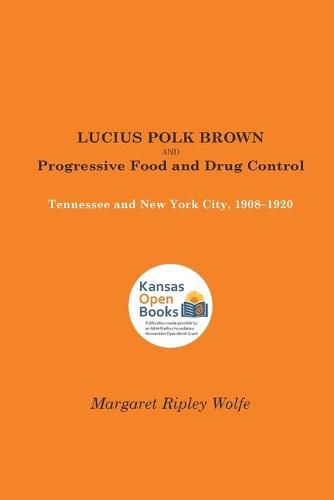Readings Newsletter
Become a Readings Member to make your shopping experience even easier.
Sign in or sign up for free!
You’re not far away from qualifying for FREE standard shipping within Australia
You’ve qualified for FREE standard shipping within Australia
The cart is loading…






Lucius Polk Brown was a professional chemist who became a bureaucrat in the field of public health during the Progressive era, when middle-class reformers first attempted to order American society through integrated systems. In his native state of Tennessee, between 1908 and 1915 Brown created a public health enforcement agency, began educating the masses to public health needs, waged flamboyant campaigns against those who violated the laws, and attracted widespread support for pure food and drug control. Moving on to become director of the Bureau of Food and Drugs in the New York City Department of Health in 1915, he continued his battle for public health reform amidst the maze of government agencies and political power struggles surrounding Tammany Hall.
In Many respects Brown was typical of Progressive reformers. A middle-class, Anglo-Saxon Protestant and a professional, he represented a link between the nineteenth-century agrarian and the twentieth-century urbanite. More importantly, Brown exemplified a new character on the American scene: a scientist out of the agricultural-experiment-station mold entering public life, ready to challenge politicians on their own ground.
This book contains fresh insights on the history of the public health movement in America, one area of reform that has not received the attention it deserves. Except for incidental references, the major figures of food and drug regulation at the local level have been largely ignored by historians. Lucius Polk Brown’s quest for pure food and drugs is representative of what municipal and state officials, as scientific people, encountered when they fought for the passage of new laws, struggled to enforce existing ones, and battled with the politicians, quacks, ignorance that threatened their efforts.
Brown’s diversified career provides a unique opportunity for studying a scientific reformer caught up in the political turmoil of the Progressive era. His experience in government service spanned twelve years and touched on two dissimilar political systems. In focusing on Brown’s struggles, achievements, and failures, Margaret Ripley Wolfe provides a comparative study of state and municipal health administrations, of bureaucratic development in a rural southern state and a northern metropolis. For that reason this book should be of interest to political scientists and public health officials as well as to social historians and students of the Progressive era.
$9.00 standard shipping within Australia
FREE standard shipping within Australia for orders over $100.00
Express & International shipping calculated at checkout
Lucius Polk Brown was a professional chemist who became a bureaucrat in the field of public health during the Progressive era, when middle-class reformers first attempted to order American society through integrated systems. In his native state of Tennessee, between 1908 and 1915 Brown created a public health enforcement agency, began educating the masses to public health needs, waged flamboyant campaigns against those who violated the laws, and attracted widespread support for pure food and drug control. Moving on to become director of the Bureau of Food and Drugs in the New York City Department of Health in 1915, he continued his battle for public health reform amidst the maze of government agencies and political power struggles surrounding Tammany Hall.
In Many respects Brown was typical of Progressive reformers. A middle-class, Anglo-Saxon Protestant and a professional, he represented a link between the nineteenth-century agrarian and the twentieth-century urbanite. More importantly, Brown exemplified a new character on the American scene: a scientist out of the agricultural-experiment-station mold entering public life, ready to challenge politicians on their own ground.
This book contains fresh insights on the history of the public health movement in America, one area of reform that has not received the attention it deserves. Except for incidental references, the major figures of food and drug regulation at the local level have been largely ignored by historians. Lucius Polk Brown’s quest for pure food and drugs is representative of what municipal and state officials, as scientific people, encountered when they fought for the passage of new laws, struggled to enforce existing ones, and battled with the politicians, quacks, ignorance that threatened their efforts.
Brown’s diversified career provides a unique opportunity for studying a scientific reformer caught up in the political turmoil of the Progressive era. His experience in government service spanned twelve years and touched on two dissimilar political systems. In focusing on Brown’s struggles, achievements, and failures, Margaret Ripley Wolfe provides a comparative study of state and municipal health administrations, of bureaucratic development in a rural southern state and a northern metropolis. For that reason this book should be of interest to political scientists and public health officials as well as to social historians and students of the Progressive era.